
-
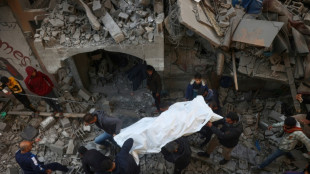 Lancet study estimates Gaza death toll 40% higher than recorded
Lancet study estimates Gaza death toll 40% higher than recorded
-
South Korea's presidential security chief resigns

-
 Italian FM tours landmark mosque in first Syria visit
Italian FM tours landmark mosque in first Syria visit
-
'Apocalyptic': ghastly remains of Malibu come into focus

-
 Pakistan flight departs for Paris after EU ban lifted
Pakistan flight departs for Paris after EU ban lifted
-
Nicolas Maduro: Venezuela's iron-fisted 'worker president'

-
 Ukraine's French-trained brigade rocked by scandal
Ukraine's French-trained brigade rocked by scandal
-
Venezuela's Maduro to take presidential oath despite domestic, global outcry

-
 Red-hot Gauff vows to keep cool in Australian Open title charge
Red-hot Gauff vows to keep cool in Australian Open title charge
-
Zverev says he has mindset to finally win Grand Slam in Melbourne

-
 Anti-war Russian theatre in Latvia fights language ban
Anti-war Russian theatre in Latvia fights language ban
-
Nobel laureate Malala Yousafzai to visit native Pakistan for girls' summit
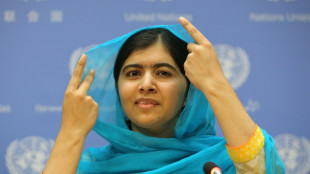
-
 Shotgun watch: LA fire evacuees guard against looters
Shotgun watch: LA fire evacuees guard against looters
-
Los Angeles fire deaths at 10 as National Guard called in

-
 'Control freak' Swiatek describes shock and 'chaos' over doping ban
'Control freak' Swiatek describes shock and 'chaos' over doping ban
-
Vietnam jails ex-lawyer over Facebook posts

-
 Sinner in dark over verdict as ATP says doping case 'run by the book'
Sinner in dark over verdict as ATP says doping case 'run by the book'
-
US President-elect Trump to be sentenced for hush money conviction

-
 AI comes down from the cloud as chips get smarter
AI comes down from the cloud as chips get smarter
-
Englishman Hall grabs share of Sony Open lead

-
 Olympic champ Zheng says 'getting closer' to top-ranked Sabalenka
Olympic champ Zheng says 'getting closer' to top-ranked Sabalenka
-
Tajikistan bets on giant dam to solve electricity crisis

-
 Air tankers fight Los Angeles fires from frantic skies
Air tankers fight Los Angeles fires from frantic skies
-
Right-wing disinformation targets DEI, 'liberal' policies as LA burns
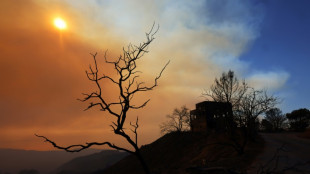
-
 Osaka to play Australian Open after 'devastating' injury pullout
Osaka to play Australian Open after 'devastating' injury pullout
-
'Disruptor' Medvedev ready to bring down Sinner and Alcaraz

-
 Atletico can seize La Liga lead as Osasuna visit
Atletico can seize La Liga lead as Osasuna visit
-
Navalny lawyers face long sentences in 'extremism' trial

-
 India's Kumbh Mela, world's largest religious gathering
India's Kumbh Mela, world's largest religious gathering
-
India readies for mammoth Hindu festival of 400 million pilgrims

-
 Uruguay bucks 2024 global warming trend
Uruguay bucks 2024 global warming trend
-
Last 2 years crossed 1.5C global warming limit: EU monitor
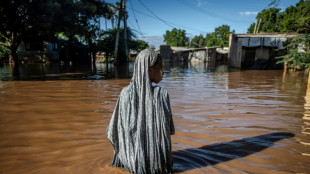
-
 Asian markets drift lower as US jobs data looms
Asian markets drift lower as US jobs data looms
-
Sabalenka has 'target on her back' in pursuit of Australian Open 'history'

-
 Croatia's populist president tipped for re-election
Croatia's populist president tipped for re-election
-
Veteran Monfils powers past teenager to reach 35th final

-
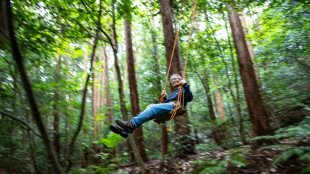 Japan 'poop master' gives back to nature
Japan 'poop master' gives back to nature
-
UN watchdog says Australia violated asylum seekers' rights

-
 Murray braced for Djokovic ire in coaching debut at Australian Open
Murray braced for Djokovic ire in coaching debut at Australian Open
-
At CES, AI-powered garbage trucks reduce battery fire risk

-
 S. Korea presidential security chief urges 'no bloodshed' in Yoon arrest
S. Korea presidential security chief urges 'no bloodshed' in Yoon arrest
-
Combustible Kyrgios says tennis 'a bit mundane' without him

-
 US Supreme Court to hear TikTok ban case
US Supreme Court to hear TikTok ban case
-
Los Angeles Rams playoff game moved to Arizona over fires: NFL

-
 Survivors patrol as looters prey on fire-wrecked Los Angeles
Survivors patrol as looters prey on fire-wrecked Los Angeles
-
US 'Pizzagate' conspiracy theory gunman killed by police: media

-
 ATP chief insists Sinner doping case 'run by the book'
ATP chief insists Sinner doping case 'run by the book'
-
Musk promotes German far-right leader in latest European intervention

-
 Inter Miami's Mascherano cools Neymar talk
Inter Miami's Mascherano cools Neymar talk
-
Danish PM reaches out to Trump over Greenland remarks


India readies for mammoth Hindu festival of 400 million pilgrims
The world's largest gathering of humanity begins in India on Monday with the opening of the Kumbh Mela, a six-week Hindu festival organisers expect to attract up to 400 million pilgrims.
Organisers say the scale of preparations for the Kumbh Mela is akin to setting up a temporary country from scratch -- in this case, one more populous than the United States and Canada combined.
"Some 350 to 400 million devotees are going to visit the mela, so you can imagine the scale of preparations," festival spokesman Vivek Chaturvedi said.
Around 150,000 toilets have been built and a network of community kitchens can each feed up to 50,000 people at the same time.
Another 68,000 LED light poles have been erected for a gathering so large that its bright lights can be seen from space.
Authorities and the police have also set up a network of "lost and found" centres and an accompanying phone app to help pilgrims lost in the immense crowd "to reunite with their families".
India is the world's most populous nation, with 1.4 billion people, and so is used to large crowds.
The last celebration at the site, the "ardh" or half Kumbh Mela in 2019, attracted 240 million pilgrims, according to India's government.
That compares to an estimated 1.8 million Muslims who take part in the annual hajj pilgrimage to Mecca in Saudi Arabia.
The government calls the Kumbh Mela a "vibrant blend of cultures, traditions, and languages, showcasing a 'mini-India' where millions come together without formal invitations".
- 'Plunge in the river' -
The Kumbh Mela, or "festival of the sacred pitcher", is held at the confluence of the Ganges, the Yamuna and the mythical Sarasvati rivers.
Its emblematic ritual is mass bathing in the holy rivers, with the dawn charge often led by naked, ash-smeared holy men, many of whom will have walked for weeks to reach the site.
Hindus believe that those who immerse themselves in the waters cleanse themselves of sin, breaking free from the cycle of rebirth and ultimately attaining salvation.
Many pilgrims embrace a life of simplicity during the festival -- vowing non-violence, celibacy and the offering of alms -- and focusing on prayer and meditation.
Santosh Mishra, 55, from a village near the holy Hindu city of Varanasi, said he and his neighbours were "super excited" for the fair to begin.
"The whole village will be going," Mishra told AFP. "It's a great feeling when everyone takes a plunge in the river together."
The festival is rooted in Hindu mythology, a battle between deities and demons for control of a pitcher containing the nectar of immortality.
Four drops of nectar were spilt during the battle and one landed at Prayagraj, where the Kumbh Mela is held every 12 years.
The other three fell on the cities of Nashik, Ujjain and Haridwar, where smaller festivals are held in intervening years.
The exact date of each celebration is based on the astrological positions of the Sun, Moon and Jupiter.
- 'Central spiritual role' -
Ceremonies include the visually spectacular "aarti", when vast numbers of priests perform rituals holding flickering lamps.
Devotees also float a sea of twinkling prayer lamps, crafted from baked flour, which glow with burning mustard oil or clarified butter.
Monday marks the start of festivities, coinciding with the full moon, with celebrations culminating on February 26, the final holy bathing day.
The mythic battle that undergirds the Kumbh Mela celebrations is mentioned in the Rig Veda, a sacred Hindu text written more than 3,000 years ago.
The festival was also mentioned by Chinese Buddhist monk and scholar Hiuen Tsang, who attended in the seventh century.
UNESCO lists the Kumbh Mela as part of the Intangible Cultural Heritage of Humanity.
It describes it as "the largest peaceful congregation of pilgrims on earth", saying it "plays a central spiritual role in the country, exerting a mesmeric influence on ordinary Indians".
E.Ramalho--PC
